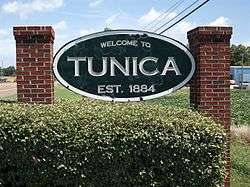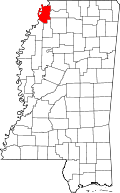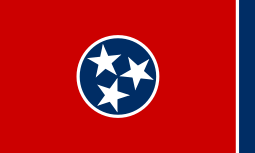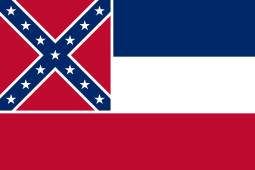Tunica, Mississippi
| Tunica, Mississippi | |
|---|---|
| Town | |
 | |
 Location of Tunica in Tunica County | |
 Tunica, Mississippi Location in the United States | |
| Coordinates: 34°41′20″N 90°22′50″W / 34.68889°N 90.38056°WCoordinates: 34°41′20″N 90°22′50″W / 34.68889°N 90.38056°W | |
| Country | United States |
| State | Mississippi |
| County | Tunica |
| Incorporated | 1888 |
| Area | |
| • Total | 0.7 sq mi (1.8 km2) |
| • Land | 0.7 sq mi (1.8 km2) |
| • Water | 0.0 sq mi (0.0 km2) |
| Elevation | 197 ft (60 m) |
| Population (2000) | |
| • Total | 1,132 |
| • Density | 1,588.4/sq mi (613.3/km2) |
| Time zone | CST (UTC-6) |
| • Summer (DST) | CDT (UTC-5) |
| ZIP code | 38676 |
| Area code(s) | 662 |
| FIPS code | 28-74760 |
| GNIS feature ID | 0678927 |
| Website | townoftunica.com |
Tunica is a town in and the county seat of Tunica County, Mississippi, near the Mississippi River. Until the early 1990s, the rural town was one of the most impoverished places in the United States, and its population has declined since the peak in 1970. It is semi-famous for the particularly deprived neighborhood known as "Sugar Ditch Alley", named for the open sewer located there.[1] Its fortunes have improved since development of a gambling resort area nearby. While population growth has occurred mostly outside Tunica, the major casinos employ numerous locals. They attract visitors from nearby Memphis, Tennessee, West Memphis, Arkansas and all over the Southeast.
The town is the fourth community to serve as county seat of Tunica County,[2] succeeding earlier county seats at Commerce (1839–1842, 1842–1847), Peyton (1842, temporary) and Austin (1847–1888).[3]
Geography
Tunica is located at 34°41′20″N 90°22′50″W / 34.68889°N 90.38056°W (34.688797, -90.380587).[4] It is about 20 miles (32 km) south of Downtown Memphis, Tennessee.[1]
According to the United States Census Bureau, the town has a total area of 0.7 square miles (1.8 km2), all land.
Demographics
| Historical population | |||
|---|---|---|---|
| Census | Pop. | %± | |
| 1890 | 198 | — | |
| 1900 | 485 | 144.9% | |
| 1910 | 555 | 14.4% | |
| 1920 | 955 | 72.1% | |
| 1930 | 1,043 | 9.2% | |
| 1940 | 1,322 | 26.7% | |
| 1950 | 1,354 | 2.4% | |
| 1960 | 1,445 | 6.7% | |
| 1970 | 1,685 | 16.6% | |
| 1980 | 1,361 | −19.2% | |
| 1990 | 1,175 | −13.7% | |
| 2000 | 1,132 | −3.7% | |
| 2010 | 1,030 | −9.0% | |
| Est. 2015 | 981 | [5] | −4.8% |
As of the census[7] of 2000, there were 1,132 people, 537 households, and 254 families residing in the town. The population density was 1,588.4 people per square mile (615.6/km²). There were 592 housing units at an average density of 830.7 per square mile (321.9/km²). The racial makeup of the town was 67.84% White, 29.42% African American, 0.27% Native American, 1.06% Asian, 0.88% from other races, and 0.53% from two or more races. Hispanic or Latino of any race were 2.30% of the population.
There were 537 households, of which 18.4% had children under the age of 18 living with them, 34.3% were married couples living together, 11.2% had a female householder with no husband present, and 52.7% were non-families. Of all households, 48.0% were made up of individuals and 26.4% had someone living alone who was 65 years of age or older. The average household size was 2.01 and the average family size was 2.94.
In the town the population was spread out with 18.9% under the age of 18, 6.1% from 18 to 24, 23.4% from 25 to 44, 28.3% from 45 to 64, and 23.3% who were 65 years of age or older. The median age was 46 years. For every 100 females there were 87.7 males. For every 100 females age 18 and over, there were 80.0 males.
The median income for a household in the town was $26,607, and the median income for a family was $54,583. Males had a median income of $30,208 versus $22,250 for females. The per capita income for the town was $20,114. About 17.1% of families and 25.5% of the population were below the poverty line, including 33.3% of those under age 18 and 21.3% of those age 65 or over.
Education
The Town of Tunica is served by the Tunica County School District. Zoned schools include Tunica Elementary School, Tunica Middle School, and Rosa Fort High School.
Tunica Academy is located in an unincorporated area in Tunica County, near Tunica.[8][9]
Casino economy
Casino gambling's effect on the local economy has spurred population growth in unincorporated parts of the county outside Tunica proper. Since 1990, the town's name has been popularly associated with several casinos located near the Mississippi River. However, the current group of casinos is located from the community of Tunica Resorts, 10 miles north of the town of Tunica, and extending to the DeSoto County line.
Tunica Resorts was originally named "Robinsonville", but the name was changed in 2005 to eliminate confusion over the location of the casinos, which have always used the name "Tunica" as an identifier. The success of these gaming houses in northern Tunica County came at the expense of the area's first group of casinos in the early 1990s, located just northwest of Tunica proper, in an area known as Mhoon Landing. This now comprises the current census-designated place of North Tunica. These casinos were closed or moved as larger resorts opened closer to Memphis to attract its larger residential base.
Unlike the area including casinos along Mississippi's Gulf Coast region, Tunica was not in the path of Hurricane Katrina. As a result, some of the regular Gulf Coast customer traffic from casinos drifted northward to Tunica County while repairs and reconstruction were underway in the Gulf Coast locations.
Though the casinos lie outside the town limits, the benefits of tax revenue generated have also aided the town. Major improvements to the public school system and downtown district are among the most visible aspects. Long-term effects include major highway improvements on U.S. Route 61 and a much-discussed potential expansion of Tunica Municipal Airport.
As of 2007, some Tunica Resorts residents are trying to incorporate their community as a separate town government,[10] rather than operate under the jurisdiction of Tunica County or be annexed into the town of Tunica. If Tunica Resorts incorporates, the new town government would directly benefit from casino tax revenue, enabling construction of municipal government offices. Depending on population and revenue growth, fire and police stations, libraries and other public infrastructure could be other likely additions. Potential effects on the existing town of Tunica are unclear.
Notable people
- Parker Hall, 1939 Most Valuable Player of the National Football League, was born in Tunica.
- Charlaine Harris, New York Times bestselling author, was born in Tunica.
James Cotton - Blues Musician and Harmonica Player for Muddy Waters was born in Tunica.
Benardrick McKinney, Linebacker For The Houston Texans Of The National Football League, Was Born In Tunica
References
- 1 2 Mehta, Stephanie N. "Legalized gambling saves a depressed town." Fortune at CNN/Money. March 15, 2007. p. 1. (Archive) Retrieved on June 3, 2013.
- ↑ NACo | Find a County
- ↑ Tunica Mississippi Press Room - Find Tunica Story Ideas, Images and More
- ↑ Census 2000 Gazetteer Files
- ↑ "Annual Estimates of the Resident Population for Incorporated Places: April 1, 2010 to July 1, 2015". Retrieved July 2, 2016.
- ↑ "Census of Population and Housing". Census.gov. Retrieved June 4, 2015.
- ↑ "American FactFinder". United States Census Bureau. Retrieved 2008-01-31.
- ↑ "Tunica town, Mississippi." U.S. Census Bureau. Retrieved on March 2, 2011.
- ↑ "Welcome to Tunica Academy." Tunica Academy. Retrieved on March 2, 2011. "584 Academy Drive, Tunica, MS 38676"
- ↑ http://www.tunicaresortsms.org/index.htm
External links
| Wikimedia Commons has media related to Tunica, Mississippi. |
| Wikivoyage has a travel guide for Tunica. |
- U.S. Geological Survey Geographic Names Information System: Tunica, Mississippi
- Mississippi Monte Carlo, an article from The Atlantic magazine on the impact of casino gambling in Tunica
- Visitor's Guide
- The Tunica Times, the weekly newspaper serving Tunica and Tunica County
- A Tunica Times report on potential diversification of the county's economy in 2006
- A Memphis Business Journal report on expansion at Tunica Municipal Airport and its expected impact

.svg.png)






